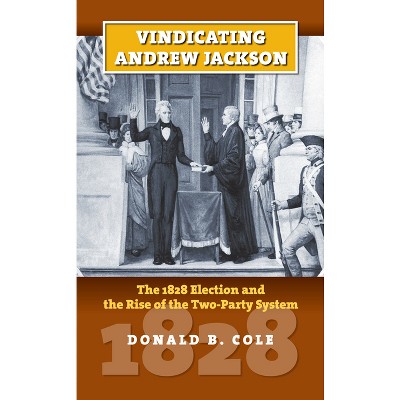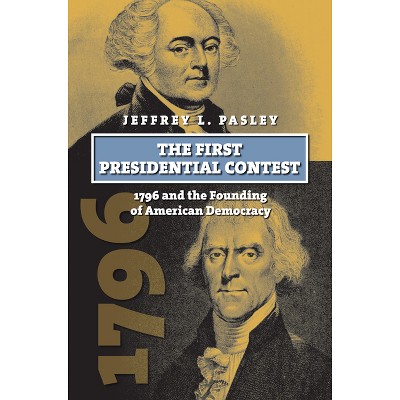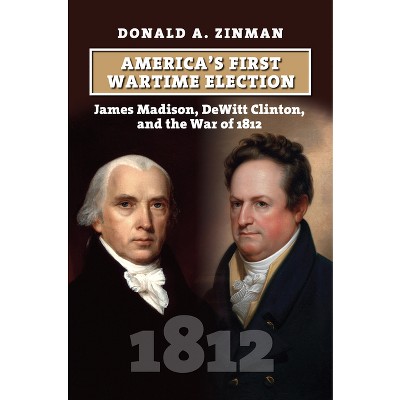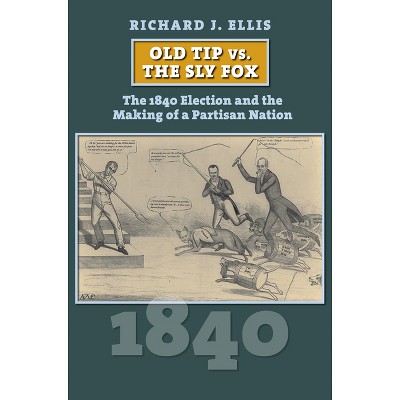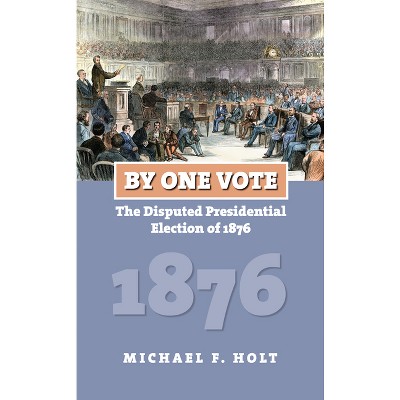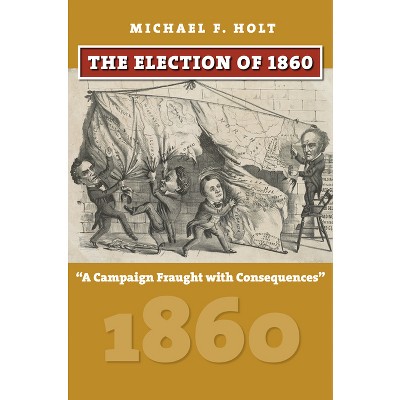The One-Party Presidential Contest - (American Presidential Elections) by Donald Ratcliffe (Paperback)

About this item
Highlights
- Winner: American Politics Group Richard E Neustadt Prize Winner: Sally and Morris Lasky Prize The election of 1824 is commonly viewed as a mildly interesting contest involving several colorful personalities--John Quincy Adams, Andrew Jackson, Henry Clay, John C. Calhoun, and William H. Crawford--that established Old Hickory as the people's choice and yet, through "bargain and corruption," deprived him of the presidency.
- Author(s): Donald Ratcliffe
- 368 Pages
- History, United States
- Series Name: American Presidential Elections
Description
About the Book
The 1824 Presidential election was a struggle between personalities; all five were from the sam party, the Democratic Republicans. The result was a contest decided in the House of Representatives.Book Synopsis
Winner: American Politics Group Richard E Neustadt Prize Winner: Sally and Morris Lasky Prize The election of 1824 is commonly viewed as a mildly interesting contest involving several colorful personalities--John Quincy Adams, Andrew Jackson, Henry Clay, John C. Calhoun, and William H. Crawford--that established Old Hickory as the people's choice and yet, through "bargain and corruption," deprived him of the presidency. In The One-Party Presidential Contest, Donald Ratcliffe reveals that Jackson was not the most popular candidate and the corrupt bargaining was a myth. The election saw the final disruption of both the dominant Democratic Republican Party and the dying Federalist Party, and the creation of new political formations that would slowly evolve into the Democratic and National Republicans (later Whig) Parties--thus bringing about arguably the greatest voter realignment in US history. Bringing to bear over 35 years of research, Ratcliffe describes how loyal Democratic Republicans tried to control the election but failed, as five of their party colleagues persisted in competing, in novel ways, until the contest had to be decided in the House of Representatives. Initially a struggle between personalities, the election evolved into a fight to control future policy, with large consequences for future presidential politics. The One-Party Presidential Contest offers a nuanced account of the proceedings, one that balances the undisciplined conflict of personal ambitions with the issues, principles, and prejudices that swirled around the election. In this book we clearly see, perhaps for the first time, how the election of 1824 revealed fracture lines within the young republic--and created others that would forever change the course of American politics.Review Quotes
"Ratcliffe's well-researched, insightful, and persuasive new interpretation of the election of 1824 will remain the key work on the subject for years to come."--Journal of American History
"A truly splendid accomplishment. Drawing on a prodigious amount of primary-source research, it effectively corrects many misconceptions sewn into both popular understandings of the election and the regrettably meager body of professional literature on the subject."--Journal of the Early Republic
"This fine book provides a detailed overview of the election of 1824, when the reigning Democratic-Republican coalition collapsed into a complex race for the presidency. Ratcliffe's analysis should force historians to rethink long-held assumptions about the rise of American democracy."--Register of the Kentucky Historical Society
"Ratcliffe explains the election of 1824 within the context of the politics of the early 1820s, a period often overlooked by historians, when the country was dealing with the aftermath of the Missouri Compromise and recovering from economic crisis."--Journal of Southern History
"Ratcliffe's mastery of the personalities, issues, and political process relevant to the 1824 election is evident."--Choice
"At last! A historian has finally got the complicated election of 1824 right. It's all here: popular participation, economic interests, slavery, ethnicity, and party politics. Congratulations to Donald Ratcliffe!"--Daniel Walker Howe, Pulitzer Prize-winning author of What Hath God Wrought: The Transformation of America, 1815-1848
"Deeply researched and lucidly written, Donald Ratcliffe's new study of the presidential election of 1824 features fresh perspectives, convincing analysis, and, best of all for fans of political history, much that surprises. This is simply a terrific book."--Michael F. Holt, Langbourne M. Williams Professor of American History Emeritus, University of Virginia
"An entertaining and illuminating account of the neglected and misunderstood presidential election of 1824. Remembered for the supposedly "corrupt bargain" between John Quincy Adams and Henry Clay and the dramatic arrival of the democratic hero Andrew Jackson on the national political stage, the 1824 canvass has never before received the attention it so richly deserves. In addition to limning fresh and sometimes surprising portraits of all the presidential hopefuls Ratcliffe consigns most of what we thought we knew into the historiographical dustbin: the bargain was not corrupt, Jackson was not the people's choice, and sectional sentiment already played a decisive role in shaping the electoral landscape. Most importantly, Ratcliffe shows that the rise of democratic politics did not have to await Jackson's ascendancy. This is the most compelling and authoritative introduction we have to the complex, often messy and always fascinating history of democratic politics in the early American republic."--Peter Onuf, author of Jefferson's Empire: The Language of American Nationhood
